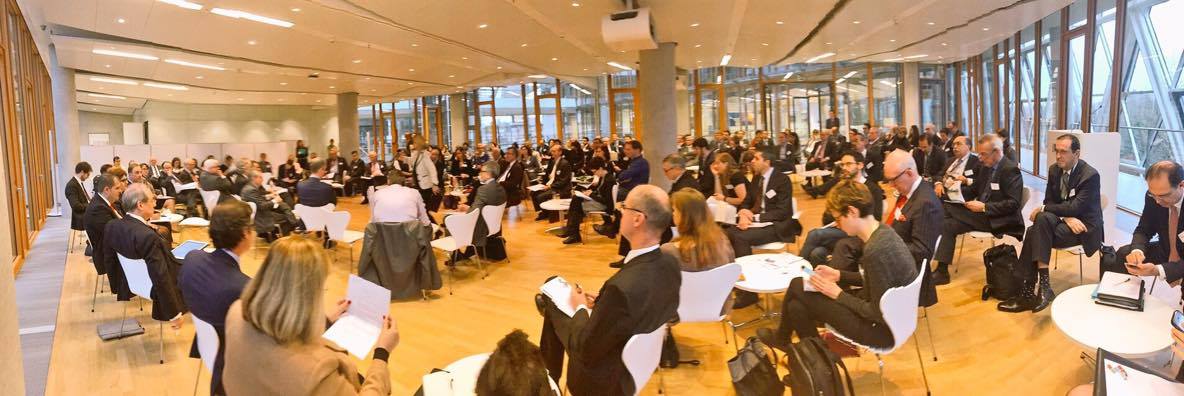The EIB gets the atmospherics right. Now it must show it can walk the talk
For the past years, the EIB has hosted an annual conference for civil society organisations, where the latter can air their concerns and be heard directly by EIB staff and members of the EIB governing bodies, engage in a dialogue and get direct answers from the people in charge of various parts of the Bank’s operations.
This year’s conference invited Transparency International EU to the panel discussion on the EIB’s accountability, giving us an opportunity to present some of the findings of our new study “Investing in Integrity? Transparency and accountability at the EIB”, as well as the occasion to brief 26 out of 29 members of the EIB’s Board of Directors on our reform recommendations (pictured above). As the Board’s agreement is needed for most reforms, it is particularly important to reach and convince the Directors.
This civil society conference is an extraordinary best practice that we call on all EU institutions to replicate. It serves to exchange ideas, to fact-check glorified brochures as well as NGO reports, and altogether elevates the whole dialogue to a new and higher level. But at the end of the day, atmospherics are not enough: results must follow.
And making such a short pitch is a good opportunity to narrow down the many recommendations we made, and to highlight the most important ones. So here it goes.
Vice-Presidents still in charge of their home countries
This is probably the most striking revelation from our study. After years of civil society scrutiny, we were amazed to find the EIB has 8 Vice-Presidents who are routinely put in charge of project proposals from their home countries. While there may be advantages – small countries with complicated languages can be difficult to navigate for outsiders – it certainly does not pass the smell test. First of all, most VP spots go to the large Member States, leading to a lack in fairness. But most importantly, the potential conflicts of interest are obvious. Two examples illustrate this:
- A former CEO from a chemicals company would likely risk conflict of interests if his former company or a close competitor ask for a loan. Likewise, the VPs may prioritise loan applications from their home country, especially if they come from a ‘national champion’ or if pressured by their national government (whom they owe their job to).
- Just imagine if the Polish Commissioner were in charge of protecting rule of law in Poland and the Spanish Commissioner were tasked with policing the Spanish budget deficit. There is a reason why Commissioners have sectoral responsibilities only.
Those responsible for loan approval do not file declarations of interests
The EIB Board of Directors is the entity that has to give final approval for any EIB loans. And yet its members are not required to file public declarations of their assets and financial interests. They do recognise the importance of this, as they declare conflicts of interests on an ad hoc basis, at the start of each Board meeting. In the absence of ongoing declarations however, it is impossible to check the veracity and completeness of the ad hoc declarations.
This is a problem given that Member States can appoint anyone as Board members. Most come from national finance ministries, but some are private sector CEOs and the Irish member even founded his own strategic consultancy and boasts on LinkedIn about his work for leading global investment banks and giants of the sharing economy.
The Bank’s defence is that the Board is not quite “executive”, even while it is responsible for the loans. Indeed on average, over one billion euro are approved per meeting hour. This, coupled with the fact that Directors only fly in 10 times a year, suggests that scrutiny happens elsewhere. But then why are only the meeting minutes of the Board released, and not those of the Management Committee, which prepares the decisions? The classic response (project approvals are not final until the Board had its say) is foot-dragging: one could easily release meeting minutes with a delay. Additionally, the Management Committee’s own declarations of interests appear to lack detail, in the words of the European Ombudsman.
Transparency at project-level
As many an European institution, the EIB longs for recognition of its work, and should do a much better job at explaining its added-value to European citizens. Glossy brochures have not gotten the job done, so a less abstract approach might be needed.
In our study, we recommended that the EIB publish (at least summaries of) how projects for the Juncker investment fund (EFSI) were assessed against the “Scoreboard of Indicators”. This is necessary because projects that receive the EFSI guarantee have to be risky enough to justify the fact that public money would be used to absorb any first losses. If projects are not truly “additional”, the EIB would simply be subsidising normal private sector risk-taking. The European Court of Auditors agrees that currently, there is insufficient information available to make this crucial distinction.
This brings us to the EFSI 2.0 regulation, which expands and extends the Juncker fund. It seems clear by now that the regulation will mandate greater transparency on how projects were assessed. We think this is the golden opportunity to extend this same approach to regular EIB-projects, which undergo a “3-pillar assessment”. This documentation is done by staff anyway, making it publically available would therefore entail only a modest administrative investment. And it would make it clear how EIB projects benefit society, beyond the two-liners that currently have to suffice in describing multi-million euro projects on the EIB’s website.
Accountable to whom?
Whom should the EIB be accountable to? It finds itself in the midst of a tangled web of EU treaties, EU law, institutional watchdogs such as the Ombudsman, Court of Auditors, and Court of Justice. But at the end of the day, the EIB is still a classic institution controlled by its shareholders, the Member States.
This can be justified primarily by the fact that Member States put up the paid-in capital for the Bank’s operations. However, the EIB is more and more called upon to implement financial instruments on behalf of the EU, leveraging the very limited EU budget funds. This should entail better accountability at the European level, but as the financial instruments were added in a haphazard way, this issue received limited attention up until recently.
The Juncker investment fund brought with it much more stringent reporting requirements to the Commission and the co-legislators. However, while the inter-institutional agreement with the Commission has been long signed, the EIB has not yet concluded such an agreement with the European Parliament. Yes, the EIB President will come to Parliament if asked, but a legal assurance thereof would help. More importantly, the EIB should commit to address each recommendation received from the European Parliament’s resolutions: some recommendations may be vague or less-than-helpful, but pointing this out regularly (e.g. as part of the annual report) may lift the quality of the entire dialogue to a whole new level.
Becoming a true EU policy tool
For structural reasons, governing bodies that accommodate all Member States have a tendency to be slower in finding consensus. If the EIB were truly responsive to the EU’s supranational institutions, it could even help in putting EU policy goals into the pipeline. Two recent examples concern promoting transparency on the beneficial owners of companies (i.e. the natural persons behind companies, trusts etc.), and the requirement for companies to report their financial information and taxes paid on a country-by-country level.
Both issues are currently making their way through the EU’s complicated law-making process. In view of a number of Member States opposing these measures for the wrong reasons, it would be more than helpful if an ambitious EIB could implement such policies via its standard contractual clauses and associated guidelines, so as to lead by example and showcase the feasibility of these progressive proposals.
Any other business
Of course there is much more – demonstratively protect whistle-blowers, publish Management Committee meeting minutes, a public gift register, adaptations to the Code of Conduct – but one has to prioritise.
We should also not forget to put the finger on the EIB’s debarment policy. As of now, a company caught engaging in prohibited conduct has to be asked for permission before it can be publically listed as debarred. This information is only published as part of the settlement agreement reached with the company, which means there is in fact no list of debarred companies. Furthermore, the EIB tried unsuccessfully to join cross-debarment networks with other multilateral lenders. Its reasoning – the Bank claims it would then have to defend other banks’ debarments in front of European courts – does not seem insurmountable. A priori, other multilateral lenders such as the World Bank and the EBRD should also follow due process, and having access to a redress mechanism is a fundamental human right after all, which applies to businesses, too.
Finally, we want the EIB to sign on to the EU Transparency Register, which is open to other EU institutions and bodies, as it is intended as an EU transparency ‘hub’. Following this, Management Committee members (EIB Vice-Presidents and the President) would only be allowed to meet registered lobbyists, and disclose these meetings online (as the Commission and ECB already do). This is necessary because Management Committee members are not supposed to participate in the preparation of loans for proposed EIB projects. If they do meet outside interests, these have to be regarded as lobbyists, not project promoters. Technical meetings should be left to EIB staff.
But that is enough for this year’s wish-list. We shall report back.





